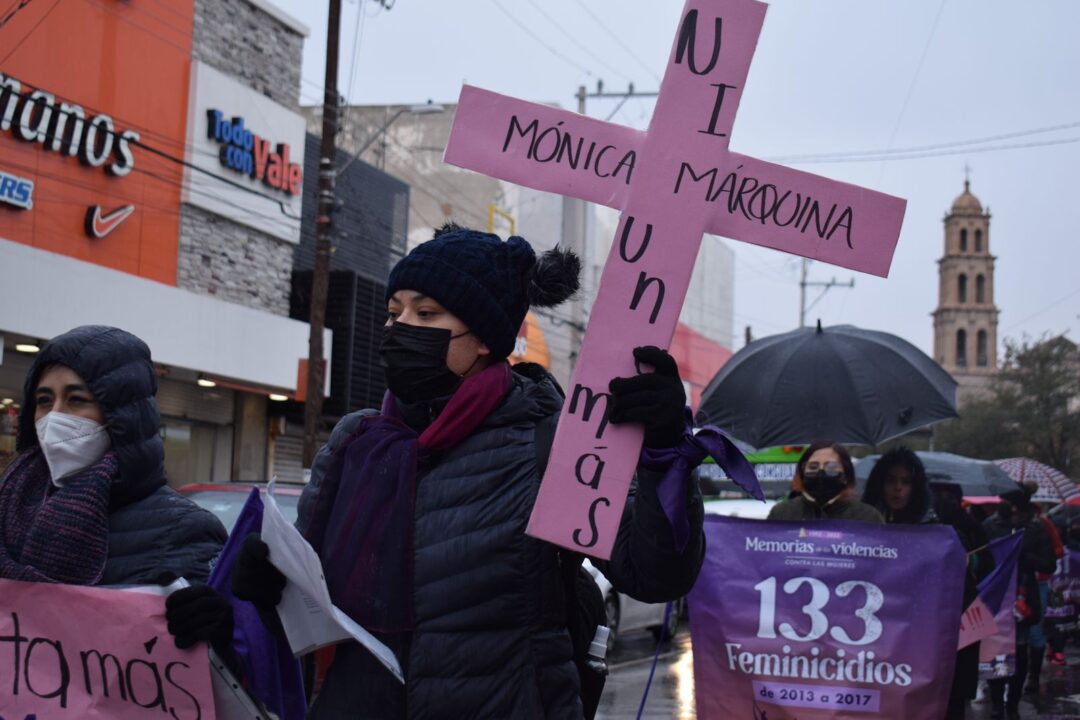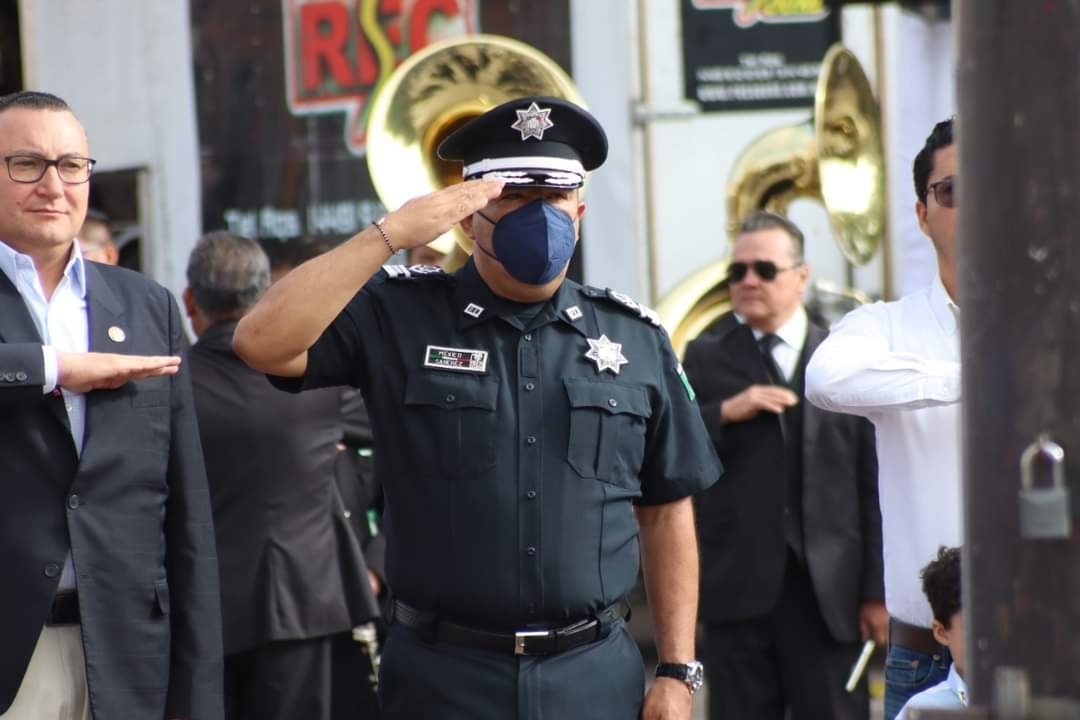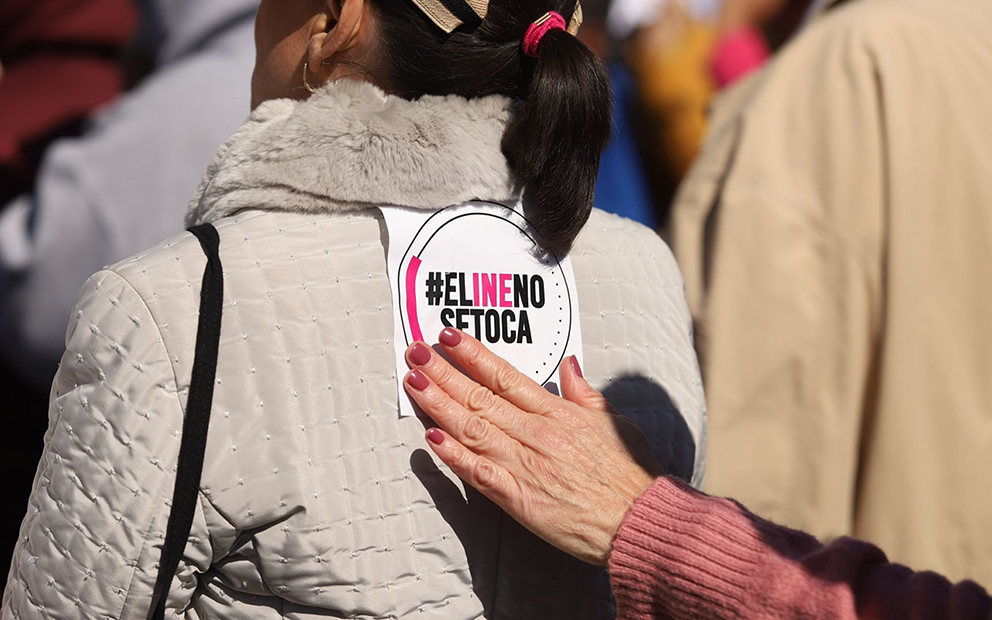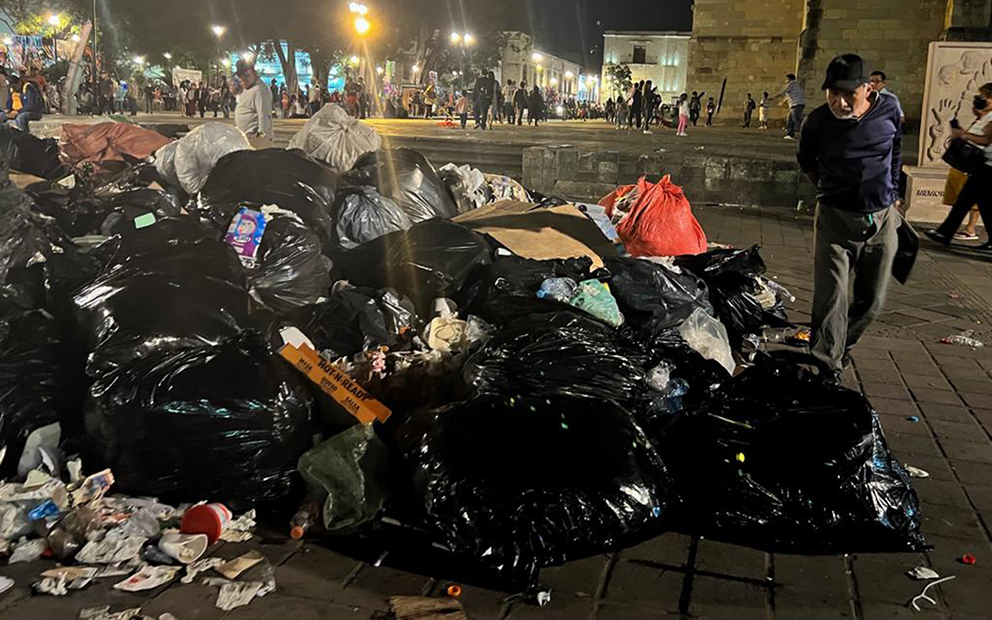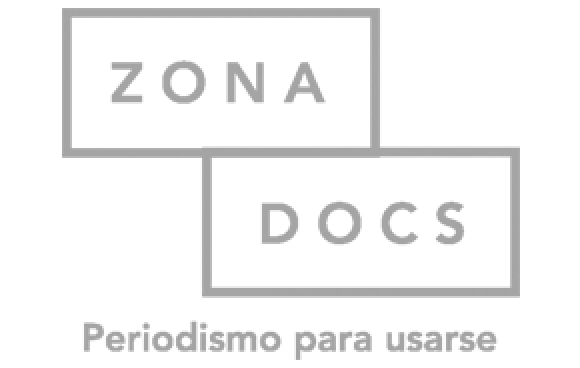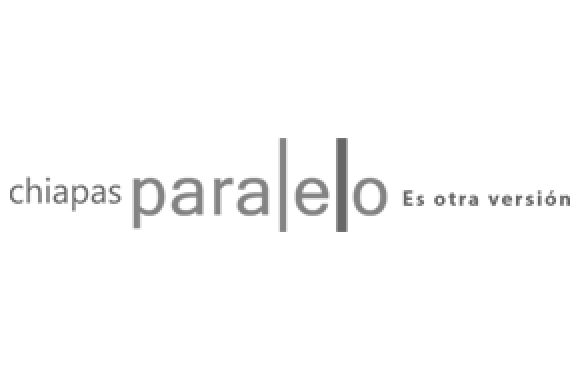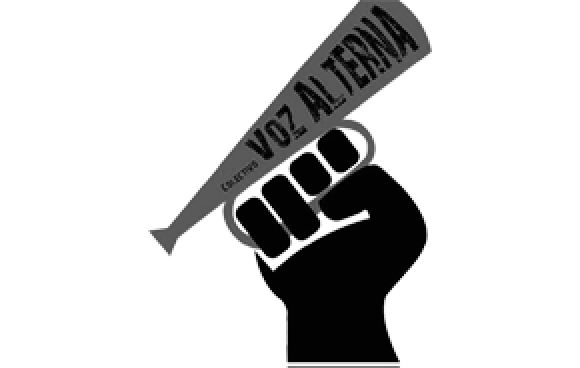Solidarity among the sick: A tale of (non) access to health in Mexico City
26 noviembre, 2021
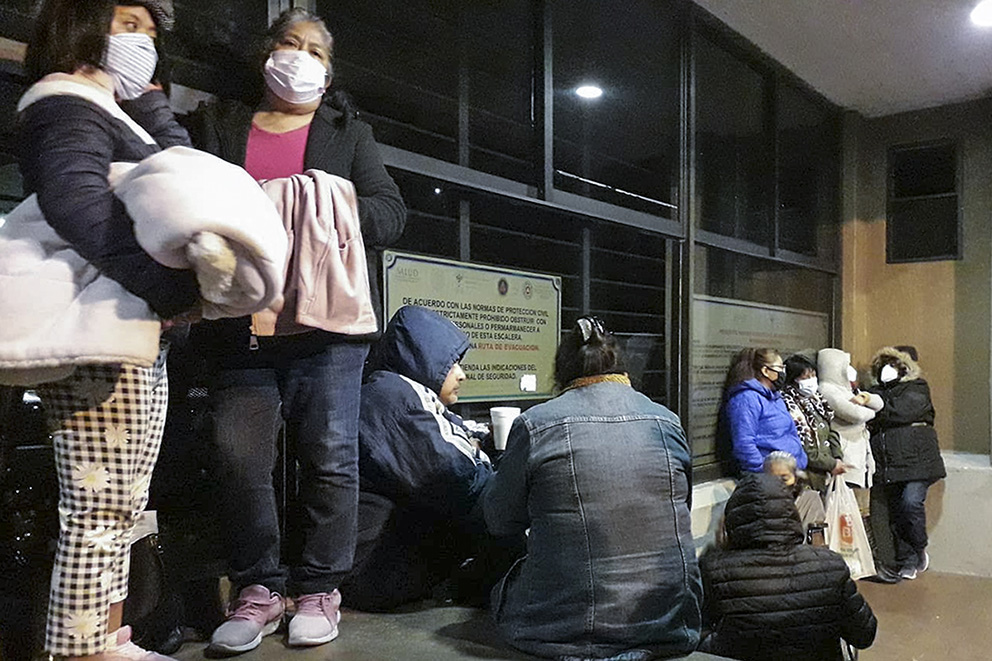
In this column, Isaura Leonardo narrates the difficulties she faced getting an appointment for her mother at Mexico’s National Cardiological Institute. Hours of waiting at dawn and hours of paperwork during the day raise the question: does the universal right to medical treatment really exist? Without the solidarity among the ill that germinates in the line-ups, getting access to health care wouldn’t be possible.
Text and photos by Isaura Leonardo, originally published November 6, 2021.
Translated by Dawn Marie Paley for Pie de Página in English.
MEXICO CITY– In September of this year, my mother, a 72 year old senior with degenerative arthritis, sleep apnea, high blood pressure and many other health problems, including scoliatic vertebra and chronic vertebral fractures, felt a very intense pain in her chest, and her blood pressure rose. We were told she should see a cardiologist. A doctor in the hospital where they are treating her back problems found traces of a prior heart attack and two murmurs, so he decided to refer her to the National Institute of Cardiology for a more thorough examination.
This is where this story starts. During my first visit to Cardiology, I was told that to make the referral valid, I had to arrive at the pre-consultation with a list of documents and “before 7am, even though the form says 8am.” I thought innocently that before 7am could be a little before 6am, and I arrived the next day with all my documents. My mom could come later, once I’d moved up in line. When I arrived, I discovered that there’s a list on which we have to add our names as we arrive, a system improvised by patients and their family members. I’m number 25.
A little bit later a lady tells her son, who is around 19 that they only open up 10 spots a day. We’re already 26 people, I do the math: “Not gonna happen,” I think, but I stick around to understand the way things work. They decide to go to emergency to try their luck. I learned that the first person on the list to get a spot arrived at 10 pm the night before, and the other nine after her slept on the stairway of the pre-consulta, outside the hospital, including a girl and a woman with disabilities; a while ago they stopped letting people stay inside at night, a woman told me later.
The rumor is generalized, 10 spots are too few for the demand. We thought that we were going to be allowed into Level 3 of this institute (which is to say, highly specialized, with equipment they don’t have on Levels 1 and 2), for which you need a letter of referral, there’s the first filter. Getting a spot is the next bridge we need to cross if we want my mother to be evaluated by a specialist in a non-private service in an institution famous for its quality. A spot only secures access to an examination, not to the service. That day they give 10 to adults and three to children, there’s five minors (some of them aren’t from Mexico City), two are waiting in hopes that someone else is missing a document and loses their spot. I give up. There’s no way I’m getting in.
***
Half joking, half serious, that afternoon I asked on Twitter: If you went to the public hospital and you didn’t get a spot, did you really go to the public hospital? A lot of things bothered me: isn’t it wrong that sick people, who are vulnerable in so many ways, have to sleep over in the street to get into the hospital to get their bodies looked after? If private health care was an option, they wouldn’t be there, laying on cardboard, coming and going during days, adjusting schedules, spending money on taxis and food. Some people may already have gone to a private clinic and are looking for a second or third opinion.
Cardiology is super prestigious, known for successfully treating heart conditions. “You don’t even know the level of service,” the young man says to his mother. “If they won’t take us in Emergency, you and Miguel, now that he’s not doing anything, can come and sleep here.” What’s wrong with this math, with this system of organization? Or is the math, simply, that not everyone can go in? Is this the best option available? Are all public systems on the face of the earth like this? Of course, I can imagine worse
Getting the pre-consultation spot becomes my mission. I have to make a plan to get there at the right time if I want one of the 10 much sought after spots. Time is passing, my mother’s heart needs attention, and I don’t want them to reject my referral letter. The bureaucracy is terrifying.
The Plan
I’ll arrive before 3 in the morning. I make a list of things I need to bring to look after myself and the illnesses that accompany me.
-Insulin (alcohol, lancets, test strips, cotton)
-Glucose tests
-Cellular phone with credit and a battery
-A blanket
-A scarf
-Foldable bench with cushion (I have had pain from early osteopenia in my hip for months)
-Medicine for the morning
-Toilet paper
-Peanuts and candies in case my blood sugar drops
-Thermos with coffee
-Notepad for taking notes
-And the most important thing: the envelope with ALL my mother’s paperwork
I told my friend Lu that I would be in the street waiting in the early hours of the morning, just in case: the statistics of femicide and enforced disappearance don’t let me forget, not even for a minute, where I live. The plan is for me to get the spot, and for my mother to come around 7am. There’s no way I would bring her to stay in line with me; we’re lucky it’s so close, others don’t have the same option and they have to come with their patients: children, elders and people with disabilities have to wait in the gripping cold before dawn and in the rain (as in the last months), exposed to the elements.
The system here is like an ouroboros, a snake that eats its own tail. We arrive at pre-consultation, we don’t get a spot, we discover that we have to arrive before dawn or the night before to get one, so we try again, then others arrive “late,” sometimes from distant parts of the country, and they learn what we already know… And it repeats, there is no resolution, it just deepens.
We’re becoming experts in Mexico’s public hospitals, as we deal with their nonsense, their bureaucracy, their precarity. I think we’re training for things that I don’t know exist in other worlds, a sick body putting itself at risk for medical attention for another (or for itself); sleeping in the street, beside a street where the cars speed by, in a city known for being unsafe, all for the chance to get medical care. I see other patients and families who have set up, they “make beds,” bring water, toothpaste, warm blankets, they know the best places to sleep. They know the deal.
My taxi comes at two in the morning. At least there’s that, I can take a cab and don’t have to walk for hours to the only hospital that exists, which is what happens in many communities. I arrive at 2:25am on Friday, one day after the celebration of Saint Judas the Apostle. I think it’s a good sign.
There’s already five people signed up for a spot, on a list improvised, again, by those who arrived first, two men who arrived at midnight to claim a spot for their patient, they’ll be there until 7am. I’m number six.
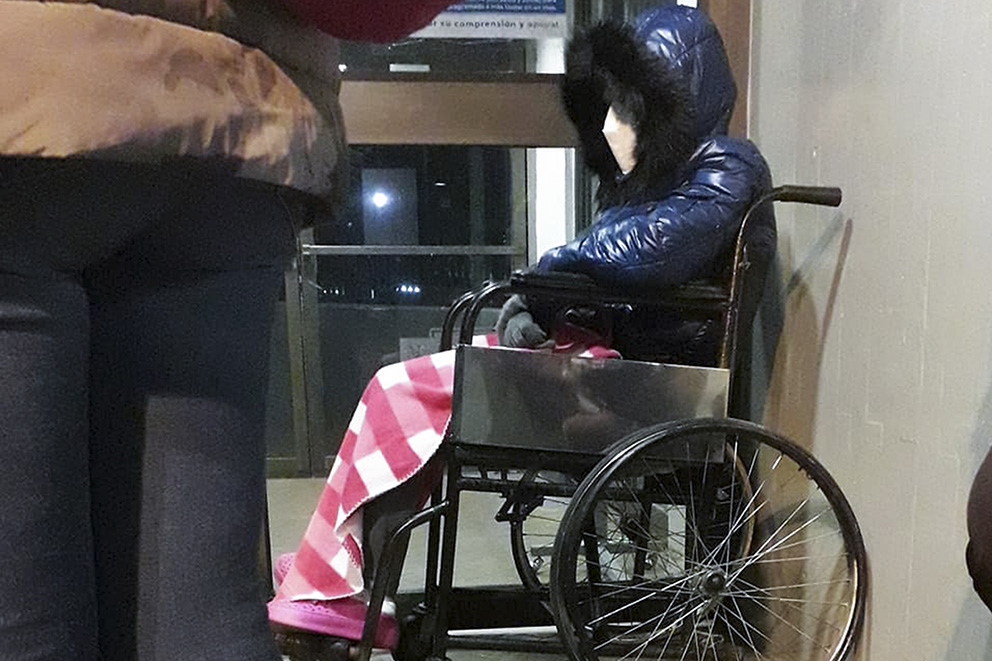
Solidarity in illness
Even though I’m the sixth on the list, not all the family members of the five people on the list are on the steps: some of them returned to their houses or the places they’re staying. They’ll come back when the door is to be opened. I’m surprised that no one tries to budge in line, no one skips ahead, no one erases anyone else’s name. We take space without avarice, we all have the same mission and we respect that.
At 3:45am, when the first vendor pulls up on his cargo bike with coffee, hot chocolate and sweet bread, one of the men who arrived first offers to buy coffee for everyone. By then, I’d made a new friend who I’ll call María, a young woman under 30, from a “little town on the way to Toluca,” whose mother is hospitalized waiting for a Cardiac catheterization.
They weren’t here for pre-consultation, but her and her sister stayed on the steps with the rest of us: they went through a hard time trying to find a room to rent, they tried to go to Emergency, where they were turned away, and they ended up here. At first, they were afraid of the two men who were sleeping on the cardboard, and I can’t blame them: we can never forget where we live, cases of femicide, rape and generalized violence are constant. My arrival, the third woman on the list, comforts them. In fact, my mother told me that if there was no one waiting, I shouldn’t stay. There’s no way I could fall asleep alone in the street, when I came up with this plan I knew I’d stay awake.
A voice inside me told me I shouldn’t be here, we’re still in a pandemic and I have diabetes, fibromyalgia and pain in my lower back and him that means I can’t sit for long. But the others shouldn’t be here either, yet here we are, because this is how it works.
My thermos proves it’s worth, at 4am my coffee is still hot. By then, the 10 spots had been filled, now we’re 14. My mother arrives at 6am, she’s happy that we got a spot, but we both know there’s still more barriers to treatment. Around then is when people start to trade off, those who stayed overnight leave and their patients, who are usually seniors, arrive with other family members who will accompany them along the rest of the long road to seeing a specialist. By 7am, 20 of us were waiting for a spot.
At 7:15 we went through the door. Maria gave me a thumbs up through the window, we made it. Maria and her sister came with a taxi driver from their town, on other occasions he has spent entire days with them, the day before he accompanied them during the pilgrimage to Saint Judas the Apostle. I think about it: without a support network, it’s impossible to get a spot. Impossible without solidarity between the sick.
At 7:48 we made it through the second filter: our papers are complete and in order. We wait to be called. Just one person is rejected, we’re sad to see them leave, our mission is shared. Paradoxically, we are happy to see that someone who didn’t get a spot enters to take their place. They let two more in, a girl with Down’s Syndrome together with her mother and another adult. We’re happy again.
At 8:25am, they called my mother for the electrocardiogram, which means we’d passed the third filter. By 9:05 we are in the short interview where they will decide if she is admitted or not, and she’s admitted. We made it! At this stage only one patient is turned away, again, we watch her leave with sadness. She’s the only one from our group who isn’t admitted.
We proceeded to social work, where they interviewed my mother at 10am, from there we left about an hour later with a medical record. We waited until 1:10pm for the appointment, finally, with a cardiologist. I’m about to hit 12 hours waiting for my mother’s treatment. I haven’t eaten because they don’t allow food, and if I leave and they call us… I’m terrified of the bureaucracy, I feel that any mistake can ruin our mission. In order to eat, we’d need a third person accompanying us.
Universal access?
I ask myself: does something like universal access to medical services exist? Is it true that each and every one of us has guaranteed treatment for our illnesses? I don’t like to use the word heath. I believe, together with the Socialist Patients Collective, that only illness exists, but that’s another story… Or not, it’s part of this one, of a system that seems designed to disparage our lives. They’ll tell me that, if they took all the cases, it would be unsustainable; so I ask again: does access to universal treatment exist, or what is it we’re talking about? Are there people who can access a dignified, autonomous, on time treatment, and others that can’t? Because of decisions made in triage, from precarity, because of public policy?
It’s 2:35pm, 12 hours after I left home to get my spot. I’m running to the hospital getting appointments and registering.
We’ve almost completed the mission: the system won’t register one of the appointments, because of that it doesn’t show up, and they can’t give me access, it closes at 3pm, which has already passed.
I’ll go home, at least, with the knowledge that my mother was admitted. There are holidays coming up, so there will be no pre-consultations on Monday, Tuesday or Wednesday (there never are on Wednesday). Those who are waiting for a cardiologist have to be patient and wait, and take advantage of the days to make their plans.
Getting the spot and getting admitted makes me think that universal access to anything is a really nice saying, but it’s not real, in fact it’s miserable.
It’s a lie. In addition, is it desirable? On what terms is this access, for who, and why? Are the lives that fit on health, productivity and capital questionnaires that clearly establish hierarchies between those who get treatment universal? And those that don’t?
My mission confirmed what I already knew: we have to fight for our lives in this world, in which millions of people are considered expendable. And this struggle can’t be sustained only by patients. As Chantal Maillard says, “we’re all terminal.”
May the solidarity of the sick be universal solidarity.
Click here to sign up for Pie de Página’s bi-weekly English newsletter.
Ayúdanos a sostener un periodismo ético y responsable, que sirva para construir mejores sociedades. Patrocina una historia y forma parte de nuestra comunidad.
Dona

